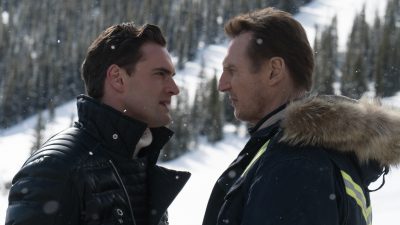
In the years since the thriller “Taken,” a subgenre of action films has risen around regular, family-oriented men who must distribute justice to a collection of faceless goons who have wronged them. The latest in this genre, “Cold Pursuit,” was released in theaters this past Friday.
At first glance, “Cold Pursuit,” a film in which a mild-mannered snowplow driver named Nels (Liam Neeson) is transformed into a vengeance-fueled killer after his son’s murder, looks like another one of those movies.
However, director Hans Petter Moland’s remake of his 2014 Norwegian film “In Order of Disappearance” deliberately evokes similarly premised revenge thrillers in order to satirize the absurd hyper-masculinity of the genre.
“Cold Pursuit” does this by undercutting deeply emotional moments, such as a father viewing his son’s body at the morgue or intense action sequences, with dry and dark humor. This humor divorces the audience from the film’s would-be dramatic beats, allowing viewers to adopt an outsider’s perspective on the story.
Thus, what would be labeled as “cool” in any other action film — gory violence, over-the-top car chases and a father’s single-minded dedication for revenge — feels senseless, indulgent and empty in “Cold Pursuit.”
The movie thrives on the fact that Neeson often stars in the type of film that “Cold Pursuit” is parodying. His persona allows the audience to easily equate Nels’ over-the-top actions with those of other action heroes.
So it’s strange when the film sidelines Neeson during the second act, instead focusing on a turf war between the drug dealers that killed Nels’ son and a gang of Native Americans.
The group of drug dealers is led by the entitled, ruthless crime boss, Viking (Tom Bateman). Besides managing the Colorado drug trade, Viking spends his time overreacting to the dangers of high fructose corn syrup while helicopter-parenting his son.
“Cold Pursuit” directly transfers traits from the original film’s Serbian gang onto the Native American gang. While this does lead to awkward, strange moments, the film plays into the pain of being labeled an outsider in lands that were once your own — a concept that works far better in the American setting of “Cold Pursuit.”
Still, the film relies on the “noble savage” trope for the Native American characters, something which, alongside an assortment of other questionable caricatures, likely arise from the director’s unfamiliarity with American culture.
Whereas other action films disregard their protagonists’ victims as disposable thugs, “Cold Pursuit” utilizes its second act to paint the eventual victims of Nels’ vengeance as people. This idea is reinforced through title cards that list names and religious affiliations of characters upon their deaths.
However, the film heavily sacrifices narrative momentum in order to develop an overstuffed cast of supporting players to hammer this point home. This makes the film’s second act feel like a messy balancing act.
“Cold Pursuit” doesn’t go too far with this sentimental streak. Instead, the film seeks to deliver comedy through absurdity, not reality, and maintain a disconnect between Nels and the audience.
For better or worse, whenever an emotional investment is imminent, a tonally dissonant mandolin score and a couple of jokes are right around the corner.
The masculine vibe of “Cold Pursuit” is purposefully off-putting. Female voices are muted to elevate Neeson as a one-man killing machine. Nels’ wife, played by an underused Laura Dern, disappears early in the film, and a police officer (Emmy Rossum) is patronized by men around her and has her subplot cut short.
Clearly, the film is trying to frame all-consuming acts of revenge, and the desire to vent grief through violence, as a distinctly masculine fantasy.
However, “Cold Pursuit” blames this on continued cycles of violence. Legacies of violence are passed through generations, with the desire to do bad things arising from bad things having been done to you.
Although “Cold Pursuit” has a reflective take on violence, Moland doesn’t deprive the film of action sequences. At one point, Neeson participates in a car chase with a snowplow — something that isn’t just an apt metaphor for his blind, destructive rage, but also just fun to watch.
Strangely enough, this also works against the film. “Cold Pursuit” revels too much in its action for any of its criticisms of the genre to be fully realized. In other words, the movie understands that killing thugs with heavy machinery is a ludicrous delusion, but it still indulges its audience.
In the end, “Cold Pursuit” is a satire that finds a darkly comedic punchline no matter how gloomy the circumstances. It’s certainly unbalanced, but Neeson advances his long action career by poking fun at the type of film he’s been making for the past decade.





Thanks for insightful review. I went to see Cold Pursuit and wholeheartedly agree how the film is an entertaining, bloody, thriller with action, drama and humor.